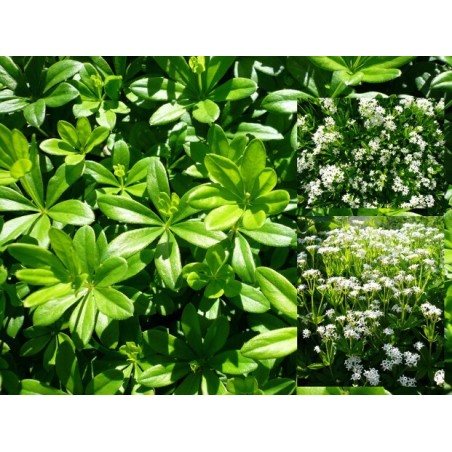






Galium odoratum - Sweet Woodruff
1 plant bare root
Available in fall and winter
-
Galium odoratum is a loveable ground cover: Easy to grow, maintenance-free (it smothers weeds), very aesthetic during the flowering period, then later in summer and autumn by the thick carpet of tender green vegetation it forms, as well as for its vanilla scent once dry and its multiple uses
The Sweet Woodruff grows naturally in humid forests
It develops from a creeping underground stem and forms dense mats covered with white starry flowers in May
Galium odoratum is therefore interesting in a garden and creates fresh greenery at the foot of trees or in cool, semi-shaded areas
(in full sun, its foliage becomes chlorotic, loses its ornamental interest, and develops little)
Galium odoratum contains coumarin at high concentration
This substance gives it a remarkable vanilla scent, which only appears when the plant dries, giving it some food uses (flavoring drinks, liqueurs, fruit wines, infusions), domestic uses (potpourri to perfume the house or linen in cupboards), and insect repellent
It is also a medicinal plant, which was used in the Middle Ages to treat wounds, cuts, and digestion and liver problems
Its medicinal properties are: Antispasmodic, Cardiac, Diaphoretic, Diuretic, and Sedative
Today, it is used against insomnia, nervousness, circulatory disorders, and liver disorders
Finally, the root of the Sweet Woodruff is a source of dye, for solid red and apricot colors
For dyeing, however, it is better to use its cousin Madder
-
| Jan | Feb | Mar | Apr | May | Jun | Jul | Aug | Sep | Oct | Nov | Dec | ||
|---|---|---|---|---|---|---|---|---|---|---|---|---|---|
| Z5 | |||||||||||||
| etc. | |||||||||||||
Plant during the fall or winter the stoloniferous roots horizontally, under 5cm of soil, without packing, and water immediately
Select a cool soil, in a shaded location
(in a sunny location, growth is limited and the leaves get chlorotic)
Soil must have a high organic matter content and be lighten with decomposing dead leaves
During winter, the aerial part of the plant dries and dies - it can be left
The plant grows back from its roots in spring every year
When it thrives, it quickly forms very ornamental dense clumps
You might also like
Payment :
PayPal < 150 €
Check < 850 €
Bank Wire > 149 €
Thank you for your kind understanding